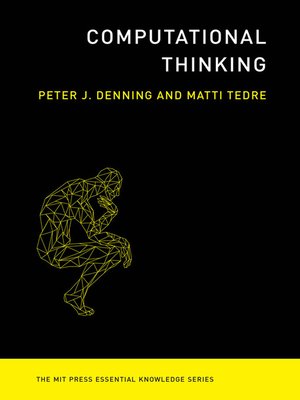
Sign up to save your library
With an OverDrive account, you can save your favorite libraries for at-a-glance information about availability. Find out more about OverDrive accounts.
Find this title in Libby, the library reading app by OverDrive.



Search for a digital library with this title
Title found at these libraries:
| Library Name | Distance |
|---|---|
| Loading... |
This pocket-sized introduction to computational thinking and problem-solving traces its genealogy centuries before the digital computer.
A few decades into the digital era, scientists discovered that thinking in terms of computation made possible an entirely new way of organizing scientific investigation. Eventually, every field had a computational branch: computational physics, computational biology, computational sociology. More recently, “computational thinking” has become part of the K–12 curriculum. But what is computational thinking? This volume in the MIT Press Essential Knowledge series offers an accessible overview—tracing a genealogy that begins centuries before digital computers and portraying computational thinking as the pioneers of computing have described it.
The authors explain that computational thinking (CT) is not a set of concepts for programming; it is a way of thinking that is honed through practice: the mental skills for designing computations to do jobs for us, and for explaining and interpreting the world as a complex of information processes. Mathematically trained experts (known as “computers”) who performed complex calculations as teams engaged in CT long before electronic computers. In each chapter, the author identify different dimensions of today's highly developed CT:
• Computational Methods
• Computing Machines
• Computing Education
• Software Engineering
• Computational Science
• Design
Along the way, they debunk inflated claims for CT and computation while making clear the power of CT in all its complexity and multiplicity.
A few decades into the digital era, scientists discovered that thinking in terms of computation made possible an entirely new way of organizing scientific investigation. Eventually, every field had a computational branch: computational physics, computational biology, computational sociology. More recently, “computational thinking” has become part of the K–12 curriculum. But what is computational thinking? This volume in the MIT Press Essential Knowledge series offers an accessible overview—tracing a genealogy that begins centuries before digital computers and portraying computational thinking as the pioneers of computing have described it.
The authors explain that computational thinking (CT) is not a set of concepts for programming; it is a way of thinking that is honed through practice: the mental skills for designing computations to do jobs for us, and for explaining and interpreting the world as a complex of information processes. Mathematically trained experts (known as “computers”) who performed complex calculations as teams engaged in CT long before electronic computers. In each chapter, the author identify different dimensions of today's highly developed CT:
• Computational Methods
• Computing Machines
• Computing Education
• Software Engineering
• Computational Science
• Design
Along the way, they debunk inflated claims for CT and computation while making clear the power of CT in all its complexity and multiplicity.







